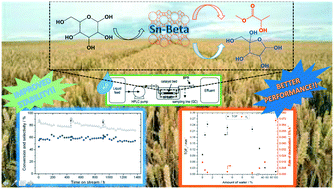Overcoming catalyst deactivation during the continuous conversion of sugars to chemicals: maximising the performance of Sn-Beta with a little drop of water†
Abstract
Producing chemicals from renewable resources represents one of the key challenges in chemical science. Whilst catalytic methods for converting renewables to chemicals offer several advantages over biological approaches, the solid catalysts developed to date are typically plagued by rapid rates of deactivation, prohibiting their greater exploitation. Here, we demonstrate, for the first time, that a Sn-containing zeolite, Sn-Beta, is capable of continuously converting saccharide solutions to value added chemicals with high levels of activity, selectivity and stability. For both the isomerisation of glucose to fructose, and the conversion of fructose to alkyl lactates, we observe that the addition of up to 10% of water to the methanol/sugar reaction feed increases reactivity by a factor of 2.5, and catalyst stability by one order of magnitude. Continuous operation for up to 1366 h (57 days) is demonstrated, with only limited loss of activity being observed over this period of time. Post-reaction characterisation indicates that the addition of water influences several elements of the catalytic system, which cooperatively result in improved performance.

- This article is part of the themed collection: Celebrating our 2021 Prizewinners


 Please wait while we load your content...
Please wait while we load your content...